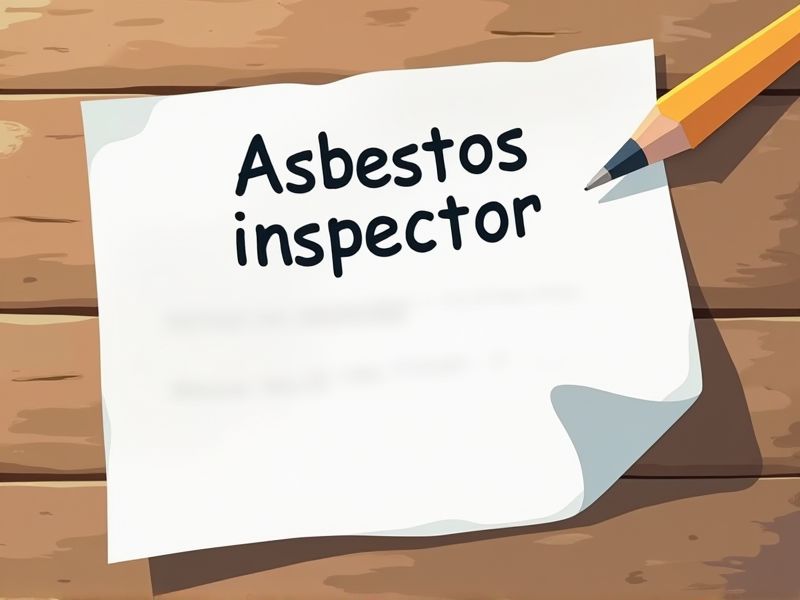
Asbestos poses severe health risks, necessitating precise handling and assessment. Certifications ensure that asbestos inspectors possess the necessary expertise to identify and assess asbestos-containing materials accurately. Regulatory compliance mandates rigorous training to protect both public safety and environmental health. Important certifications for asbestos inspectors include specialized qualifications that demonstrate proficiency in industry standards.
EPA Asbestos Inspector Certification
The EPA Asbestos Inspector Certification ensures that inspectors are well-versed in identifying asbestos-containing materials in compliance with federal regulations. Without this certification, inspectors lack the credibility necessary to conduct assessments accurately and safely. Proper certification equips inspectors with the knowledge to mitigate health risks associated with asbestos exposure. Legal requirements mandate the certification to uphold public safety and environmental standards.
State-Specific Asbestos Inspector Certification
State-Specific Asbestos Inspector Certification is essential because different states have unique regulations and safety standards that inspectors must adhere to. This certification ensures inspectors are knowledgeable about state-specific laws, reducing the risk of legal issues and health hazards. It promotes consistent training and evaluation, improving overall inspection quality within a state. Proper certification ultimately safeguards public health by ensuring accurate identification and management of asbestos materials.
AHERA Certified Asbestos Inspector
AHERA certification ensures that an asbestos inspector is trained according to federal guidelines, reducing the risk of improper handling. Proper identification and management of asbestos-containing materials prevent potential health hazards, such as lung disease and cancer. An AHERA certified inspector follows strict assessment protocols, ensuring compliance with environmental regulations. Accurate asbestos assessments protect building occupants and avoid costly legal repercussions.
NESHAP Asbestos Inspector Certification
NESHAP Asbestos Inspector Certification is required because it ensures inspectors are knowledgeable about federal asbestos regulations, safeguarding public health by minimizing asbestos exposure. Certified inspectors can accurately identify and assess asbestos-containing materials, leading to proper management and abatement. Non-certified inspectors lack standardized training, increasing the risk of improper handling, which could result in health hazards and legal penalties. Certification also enhances credibility, which is crucial for building trust with clients and stakeholders in projects involving asbestos.
Certified Asbestos Consultant (CAC)
The presence of asbestos in buildings poses significant health risks, making the expertise of a Certified Asbestos Consultant (CAC) essential for accurate identifications and evaluations. Regulations and safety standards require specialized assessments, which CACs are trained to perform, ensuring compliance and risk management. Misidentification or improper handling of asbestos can lead to severe legal and medical consequences, highlighting the importance of a qualified professional. CACs possess advanced knowledge and practical experience necessary to develop and implement effective asbestos management plans, safeguarding public health and minimizing liability.
OSHA Asbestos Awareness Certification
OSHA Asbestos Awareness Certification is essential for an asbestos inspector because it ensures they understand the health risks associated with asbestos exposure. The certification provides inspectors with knowledge on recognizing asbestos-containing materials, reducing the risk of accidental exposure. It equips them with regulatory compliance skills, adhering to OSHA standards and avoiding legal penalties. Proper training enhances the inspector's ability to implement effective safety protocols during inspections.
OSHA 40-Hour HAZWOPER Certification
The OSHA 40-Hour HAZWOPER Certification is needed for asbestos inspectors due to the hazardous nature of asbestos exposure, which can lead to severe respiratory diseases. Regulations mandate comprehensive training to ensure inspectors can identify and handle asbestos safely, minimizing health risks. This certification provides essential skills in personal protective equipment usage, crucial for maintaining safety during inspections. Failure to obtain this certification could result in non-compliance penalties and increased liability for asbestos-related health issues.
Certified Industrial Hygienist (CIH)
A Certified Industrial Hygienist (CIH) ensures accurate identification and assessment of asbestos risk in a facility, minimizing potential health hazards due to exposure. Their expertise in industrial hygiene principles helps in designing effective control measures and remediation strategies, reducing the likelihood of asbestos-related illnesses among workers and occupants. With comprehensive training in occupational safety, a CIH brings reliability to compliance with regulatory standards, ensuring legal and safe handling of asbestos materials. Their involvement safeguards against costly legal complications and enhances the organization's reputation for maintaining a safe environment.
Certified Hazardous Materials Manager (CHMM)
Asbestos is a hazardous material, and effective management requires certified oversight to prevent health risks; a Certified Hazardous Materials Manager (CHMM) provides the necessary expertise. Handling asbestos involves complex regulatory requirements that CHMMs are trained to navigate, ensuring legal compliance. CHMMs possess a comprehensive understanding of risk assessment, crucial for identifying and mitigating asbestos exposure effectively. Their certification signifies proficiency in hazardous materials management, instilling confidence in clients and stakeholders about safety and thoroughness.
Asbestos Project Manager Certification
Asbestos Project Manager Certification is required because it ensures that asbestos inspectors possess the necessary skills and knowledge to safely manage and oversee asbestos-related projects. This certification reduces health risks by ensuring compliance with safety regulations and procedures. It also improves the accuracy of asbestos inspections by equipping inspectors with up-to-date industry practices and information. Certified project managers can better coordinate project timelines and resources, enhancing overall project efficacy and safety.
Summary
When you obtain asbestos inspector certifications, your employability in the construction and environmental sectors increases significantly. Certified inspectors often command higher salaries due to their specialized expertise. Professionals in this field with credentials can conduct more accurate and thorough assessments, leading to safer work environments. Regulatory compliance is ensured, reducing legal risks for employers and enhancing your professional reputation.
